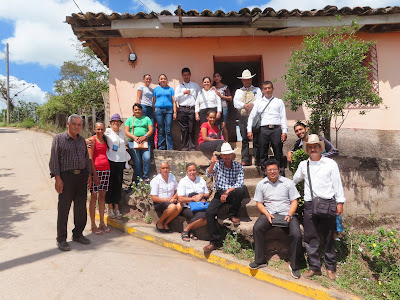I would often go to a community on a Sunday morning for a Celebration of the Word with Communion; after the celebration, I would go to visit the sick and the elderly. I tried to visit communities where there was no communion minister.
I have also accompanied the communion ministers in their monthly meetings.
February 11 is the World Day of the Sick, promoted by the popes, on the feast of Our Lady of Lourdes, whose shrine is a center for healing.
The month before the pandemic, we had a special activity for the World Day of the Sick in San Agustín. A large group of communion ministers got together and visited the sick there and in a neighboring village, Descombros.
At that time, there was only one communion minister and she visited the many sick, but it was hard for her to attend so many people. At that time, I would come several times and visit the sick.
This was a special occasion. We met for prayer in the church. Several people from San Agustín served as guides and each communion minister visited two or three people. We got together afterwards for a reflection and a lunch together. It was a good experience.
This year, the communion ministers will visit the sick, the elderly, and those confined to their homes on February 11 and 12. I won’t be able to accompany them because I have two pre-marriage interviews on Saturday morning. I’ve had five so far since January 1. These couples want to receive the sacrament of matrimony before Lent!
Last year, we also visited the sick in San Agustín as well as in other nearby communities.
In the last months of 2022, I didn’t make many visits, partly because of a serious chest cold that took months to get over – even with visits to two doctors.
This year, the day of the sick has special relevance for me, since I have been diagnosed with prostate cancer and hope to begin treatment shortly.
The words of Pope Francis touch my heart.
Pope Francis begins noting the importance of accompanying the sick:
Illness is part of our human condition. Yet, if illness is experienced in isolation and abandonment, unaccompanied by care and compassion, it can become inhumane. When we go on a journey with others, it is not unusual for someone to feel sick, to have to stop because of fatigue or of some mishap along the way. It is precisely in such moments that we see how we are walking together: whether we are truly companions on the journey, or merely individuals on the same path, looking after our own interests and leaving others to “make do”.
How many of the sick and the elderly live in isolation, with little care by their family and friends.
But I have seen so many of the sick accompanied and cared for by family members. I recall the older woman cared for by her young grandson, the young man who fell and hurt his back who was cared for by his companion, the young man who cared for his future wife after she had a difficult birth, the family that cared for their ill grandfather, and so many more. I have felt so connected with them since I cared for my dad in the last years of his life. I have sometimes shared this with the caregivers, commending them for their care and reminding them that they are the hands of Christ caring for their sick or elderly relative.
I was reluctant to share news of my cancer. But after sharing with a few people, I have been overwhelmed with prayers, offers of support, real solidarity. Some survivors of prostate cancer have told me of their experience.
It’s overwhelming and gives me great consolation and, in some mysterious way, it has given me renewed strength to live my diaconal vocation.
But it is important to face my vulnerability.
In his message, Pope Francis wrote:
…it is especially through the experience of vulnerability and illness that we can learn to walk together according to the style of God, which is closeness, compassion, and tenderness.In the last year or so, I have become more conscious of my vulnerability and weakness; I am, after all, 75 years old.
Now with this cancer, I am experiencing illness, though I have resources that most others here don’t.
Thanks be to God, this has opened up depths of compassion that I didn’t realize that I had. When I drove to San Pedro Sula last week to meet with the urologist and the oncologist, I had a deep sense of connection and compassion to all the people I saw – especially the poor walking, working, and living at the side of the road.
I think of the experience of Thomas Merton at Fourth and Walnut in Louisville, Kentucky, on March 18, 1958, as related in Conjectures of a Guilty Bystander, pages 141-142.
In Louisville, at the corner of Fourth and Walnut, in the center of the shopping district, I was suddenly overwhelmed with the realization that I loved all those people, that they were mine and I theirs, that we could not be alien to one another even though we were total strangers. It was like waking from a dream of separateness, of spurious self-isolation in a special world, the world of renunciation and supposed holiness. The whole illusion of a separate holy existence is a dream....We are part of each other. We are all brothers and sisters, as Pope Francis wrote in his last encyclical Fratelli Tutti. Our illness and vulnerability can open us to the sick and vulnerable around us – remembering that Jesus too shares our vulnerability.





No comments:
Post a Comment